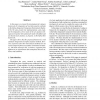Free Online Productivity Tools
i2Speak
i2Symbol
i2OCR
iTex2Img
iWeb2Print
iWeb2Shot
i2Type
iPdf2Split
iPdf2Merge
i2Bopomofo
i2Arabic
i2Style
i2Image
i2PDF
iLatex2Rtf
Sci2ools
125
click to vote
ETFA
2008
IEEE
2008
IEEE
Framework for real-time analysis in Rubus-ICE
In this paper, we present the development of a plug-in framework for integration of real-time analysis methods in the Rubus Integrated Component Environment (RubusICE). We also present the implementation, and evaluate the integration, of two state of the art analysis techniques (i) response-time analysis for tasks with offsets and (ii) shared stack analysis, as plug-ins, in the Rubus-ICE framework. The paper shows that the proposed framework is well suited for integration of complex analysis methods. However, experience also show that analysis methods are not easily transferred from an academic environment to industry. The main reason for this, we believe, originates from differences in requirements and assumptions between industry and academia.
Analysis Methods | Art Analysis Techniques | Emerging Technology | ETFA 2008 | Real-time Analysis Methods |
Related Content
| Added | 29 May 2010 |
| Updated | 29 May 2010 |
| Type | Conference |
| Year | 2008 |
| Where | ETFA |
| Authors | Kaj Hänninen, Jukka Mäki-Turja, Staffan Sandberg, John Lundbäck, Mats Lindberg, Mikael Nolin, Kurt-Lennart Lundbäck |
Comments (0)

